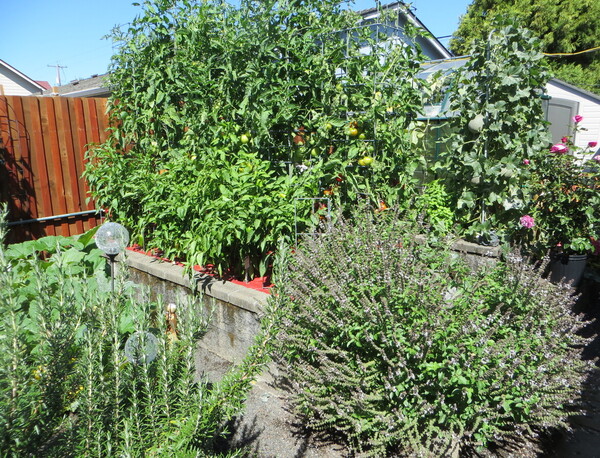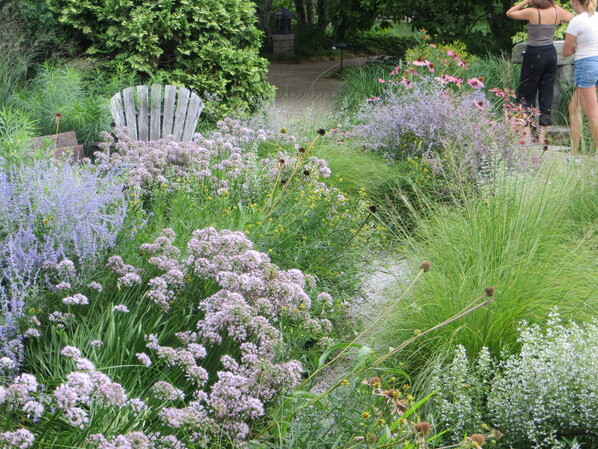In the Garden Ecology Lab, researchers are studying specific pieces of the garden ecology puzzle, including soil nutrient levels, pollinators, and native plants. But what exactly is “garden ecology”, and why is studying it important?
Let’s start by defining our terms. If you hear the word “garden”, some pretty specific pictures may come to mind, but it is really a very broad term, encompassing anything from pots on a patio to acres of arboretum. A garden is by definition a human-influenced system involving plants, but there are many human-influenced landscapes that are not considered gardens, such as agricultural fields (though gardens may grow food), golf courses (though a garden could include a putting green), tree farms (though many gardens have trees), and parks (though ornamental plants may grow in parks).

Brittanica defines a garden as a “Plot of ground where herbs, fruits, flowers, vegetables, or trees are cultivated.” This suggests that the keys are variety and control. A garden is typically composed of a variety of different plants and types of spaces…not unlike a natural ecosystem! In addition, there is the element of control (cultivation). Human choice and aesthetic sensibilities strongly influence what plants grow in a garden. Even a very naturalistic garden has some human-imposed order in it, or it wouldn’t be a garden.

Now we get to “ecology”. Ecology is a relatively new natural science, with beginnings in the early 1900’s, when scientists in Europe and the U.S. began to study plant communities. At first animal and plant communities were studied separately, but eventually American biologists began to emphasize the interrelatedness of both communities.1
The word Ecology (originally oekologie) comes from the Greek oikos, meaning “household,” “home,” or “place to live”, so ecology is the study of the relations and interactions between organisms and their environment – the place they live. Brittanica further clarifies that “These interactions between individuals, between populations, and between organisms and their environment form ecological systems, or ecosystems.”
The study of ecology most often takes place in natural, or near-natural, areas, such as a forest, meadow or mountain. Ecologists study these wilderness environments, searching for guidance on how to restore degraded ones. This reinforces the common concept of nature as being “out there”, far away from where most people live.
Urban ecology studies parks, greenbelts, and forest preserves – the large, public green spaces of a city. But garden ecology? Can something as small as most gardens have an ecology at all? And why should we care?
Well, if you have a garden, and spend much time caring for it, then you are a part of the ecology of that place. Every person who manages a plot of land, however small, is part of the ecology of that land, and all of them together, along with the other people and parts of a city, form the ecology of that city. What is done on those small plots, what grows and lives (or doesn’t) on each one, multiplied by hundreds or thousands or hundreds of thousands of individual plots, has the potential to influence the ecosystem – and the health – of the entire city.
The deeply-entrenched American reverence for lawns means that, at present, the relatively barren landscape of manicured, often chemical-soaked turf is the dominant ecosystem in most cities. Ecologically speaking, such sites don’t contribute much to the local ecosystem.
But that is changing, as more people become aware that a diverse, densely-planted landscape can support a diverse cast of fauna and provide many ecosystem services, including carbon sequestration. This enriches the local ecosystem immeasurably. If this stewardship ethic can be multiplied by even a fraction of the yards in a city, we will begin to see that “garden ecology” is another name for OUR ecology. It is the interrelationship of we humans to the plants and animals, stones and streams, among which we make our homes. It is part of understanding that nature is not just far away, in pristine wilderness. Nature is right here, sipping nectar from your flowers, nesting in your trees, burrowing under your feet and buzzing past your nose.
1https://www.britannica.com/science/ecology

